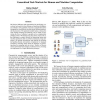Free Online Productivity Tools
i2Speak
i2Symbol
i2OCR
iTex2Img
iWeb2Print
iWeb2Shot
i2Type
iPdf2Split
iPdf2Merge
i2Bopomofo
i2Arabic
i2Style
i2Image
i2PDF
iLatex2Rtf
Sci2ools
AAAI
2010
2010
Generalized Task Markets for Human and Machine Computation
We discuss challenges and opportunities for developing generalized task markets where human and machine intelligence are enlisted to solve problems, based on a consideration of the competencies, availabilities, and pricing of different problemsolving resources. The approach couples human computation with machine learning and planning, and is aimed at optimizing the flow of subtasks to people and to computational problem solvers. We illustrate key ideas in the context of Lingua Mechanica, a project focused on harnessing human and machine translation skills to perform translation among languages. We present infrastructure and methods for enlisting and guiding human and machine computation for language translation, including details about the hardness of generating plans for assigning tasks to solvers. Finally, we discuss studies performed with machine and human solvers, focusing on components of a Lingua Mechanica prototype.
AAAI 2010 | Human | Intelligent Agents | Lingua Mechanica | Machine |
Related Content
| Added | 29 Oct 2010 |
| Updated | 29 Oct 2010 |
| Type | Conference |
| Year | 2010 |
| Where | AAAI |
| Authors | Dafna Shahaf, Eric Horvitz |
Comments (0)

